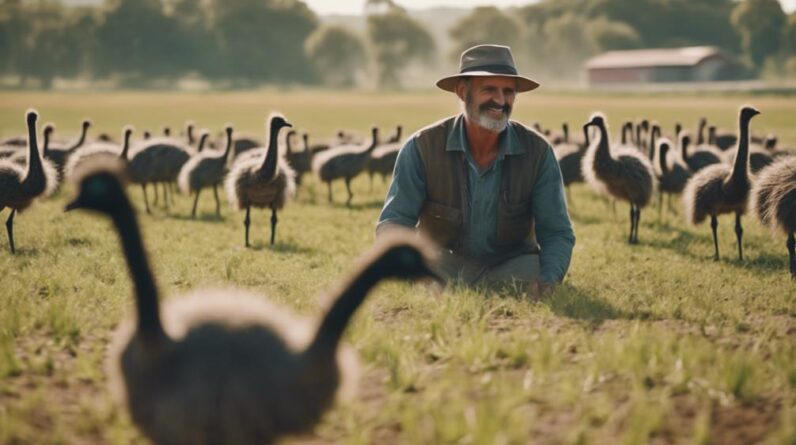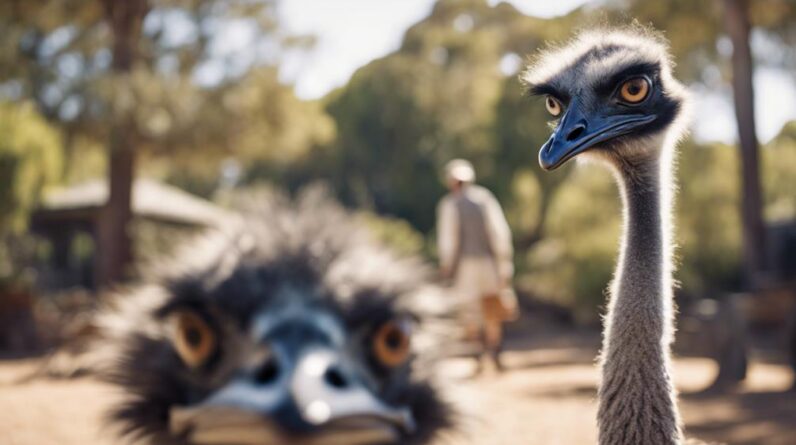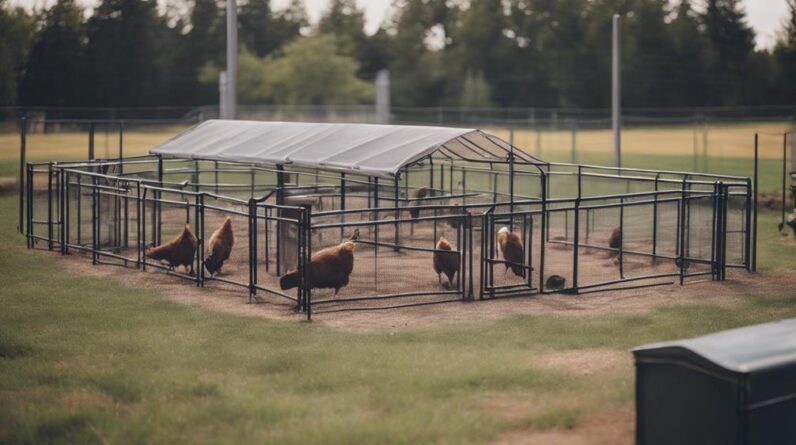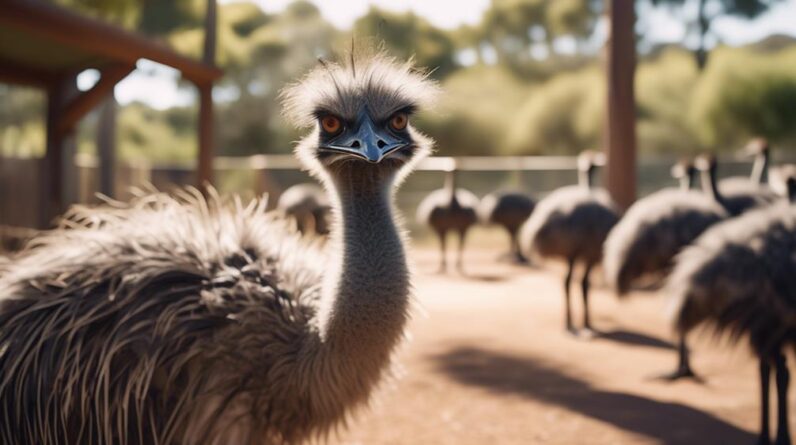
You know what they say: 'An ounce of prevention is worth a pound of cure.'
When it comes to caring for emus, it's crucial to have a comprehensive care plan in place to ensure their health and well-being.
From providing suitable housing and a balanced diet to addressing their socialization needs and implementing safety measures, crafting a comprehensive emu care plan requires careful consideration and attention to detail.
But where do you begin? How do you navigate the complexities of emu care and create a plan that covers all the essential aspects?
Well, buckle up, because in this discussion, we'll explore the key components of a comprehensive emu care plan, leaving you equipped with the knowledge and tools to give your emus the best care possible.
Key Takeaways
- Adequate space and a secure enclosure with tall fences are essential for providing a comfortable and safe environment for emus.
- Emus require a balanced diet consisting of a variety of plant materials, supplemented with fruits and protein sources.
- Regular exercise, enrichment activities, and socialization with other emus are necessary for keeping emus physically and mentally engaged.
- Regular veterinary care, preventive measures, and a clean environment are crucial for maintaining the health and well-being of emus.
Emu Housing Requirements
To ensure the well-being and comfort of your emus, it's essential to provide them with proper housing that meets their specific requirements. Emu housing design plays a crucial role in creating a suitable environment for these magnificent birds.
One important consideration is providing enough space for them to move around comfortably. Emus are large, active birds that need ample room to walk, run, and stretch their wings. A well-designed emu enclosure should be spacious and secure, with tall fences to prevent escape and protect them from predators.
Emu habitat considerations are also vital when designing their housing. Emus are native to Australia, where they inhabit open grasslands and scrublands. Therefore, emu housing should mimic their natural habitat as much as possible. Providing a large outdoor area with access to grassy patches and dirt for dust bathing will help satisfy their natural instincts.
It's also important to provide shelter from extreme weather conditions, such as strong winds and excessive heat. A sturdy shelter or shade structure will protect them from the elements and ensure their comfort.
Emu Dietary Needs
Creating a well-rounded care plan for your emus involves not only providing suitable housing but also understanding their specific dietary needs. Emus are herbivores and their feeding habits consist of foraging for various plants, fruits, and seeds. To ensure your emus receive the necessary nutrition, consider the following points:
- Emu Nutritional Requirements: Emus require a balanced diet that includes a variety of plant materials. Provide them with fresh grass, hay, and leafy greens such as lettuce and kale. Supplement their diet with fruits like apples and melons to add essential vitamins.
- Protein Intake: Emus need a sufficient amount of protein for growth and maintenance. Offer them protein-rich foods like legumes, such as lentils and chickpeas, or specially formulated emu feed that meets their nutritional needs.
- Water Access: Emus require access to clean, fresh water at all times. Ensure they have a reliable source of water, such as a shallow pond or a large water trough, for drinking and bathing.
- Supplementing Vitamins and Minerals: Emus may benefit from additional supplementation of vitamins and minerals, especially Vitamin E and selenium. Consult with a veterinarian to determine the appropriate supplements for your emus' specific needs.
Emu Exercise and Enrichment
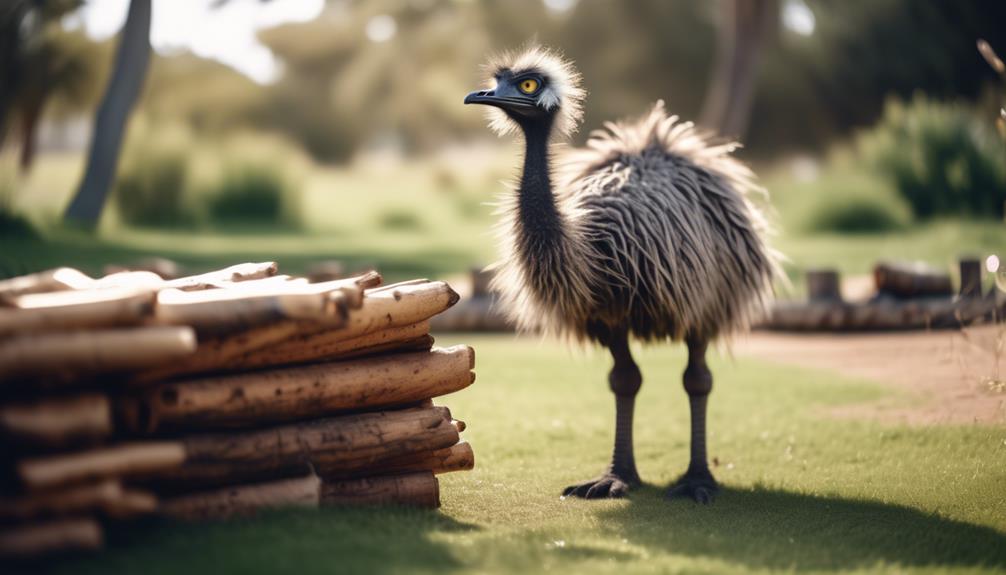
Emus thrive when provided with regular exercise and a stimulating environment to keep them physically and mentally engaged. Emu agility training is an important aspect of their exercise routine. These large flightless birds are naturally fast and agile, and it's essential to provide them with opportunities to utilize their natural abilities. Setting up obstacle courses or creating spaces where they can run and jump can help fulfill their need for physical exercise and keep them in optimal shape.
In addition to physical exercise, emus also require mental stimulation. These intelligent birds need activities that challenge their minds and prevent boredom. Providing them with puzzle feeders, toys, and objects to explore can keep them mentally engaged. Emus enjoy pecking at objects and investigating their surroundings, so incorporating different textures and materials can help stimulate their curiosity.
It is important to note that emus are social animals and thrive in the company of their own kind. Group activities and interactions with other emus can provide additional mental stimulation and enrich their lives. Providing a variety of objects and activities in their environment can also prevent the development of destructive behaviors, as it keeps them engaged and entertained.
Emu Health and Veterinary Care
As you focus on the health and veterinary care of your emus, it's crucial to ensure their well-being through regular check-ups and appropriate medical attention. Emus, like any other animals, can experience medical emergencies that require immediate attention. Here are four important aspects to consider when it comes to emu health and veterinary care:
- Regular veterinary check-ups: Schedule routine veterinary visits to monitor the overall health of your emus. A qualified veterinarian will conduct thorough examinations, which may include physical assessments, blood tests, and fecal examinations to detect any underlying health issues.
- Emu medical emergencies: Be prepared for unexpected medical emergencies by having a designated veterinarian who specializes in emu care. Familiarize yourself with common medical emergencies such as respiratory distress, fractures, and egg binding, and have a plan in place to address these situations promptly.
- Reproductive health: If you have breeding emus, it's essential to pay close attention to their reproductive health. Regular fertility examinations, proper nesting materials, and appropriate breeding practices can help ensure successful breeding outcomes.
- Preventive measures: Emus are susceptible to certain diseases and parasites. Implement preventive measures such as vaccinations, regular deworming, and maintaining a clean and hygienic environment to minimize the risk of illnesses.
Emu Socialization and Behavior
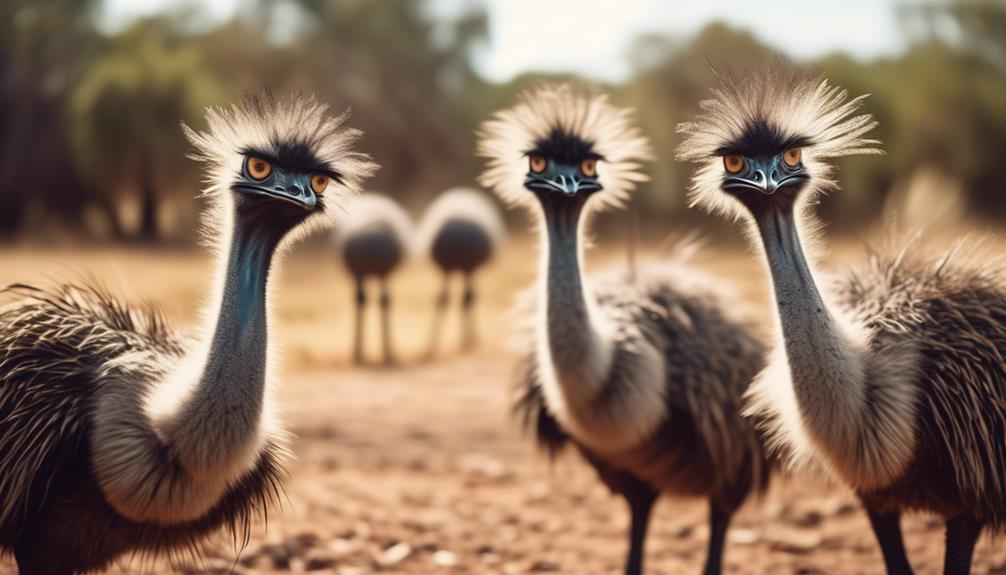
To ensure the well-being and proper development of your emus, it's crucial to understand and address their socialization and behavior needs. Emus are highly social birds that thrive in a flock environment. They form strong bonds with their flock members and rely on social interactions for their emotional well-being. Emu flock dynamics are complex and fascinating, with established hierarchies and intricate communication systems.
When it comes to training techniques, positive reinforcement is key. Emus respond well to rewards such as treats or praise when they exhibit desired behaviors. Establish a consistent training routine and use patience and consistency to reinforce good behavior.
Emus also require ample space to roam and explore. Providing them with a large outdoor enclosure allows them to exhibit natural behaviors and helps prevent boredom and aggression. Ensure there are plenty of hiding spots and enrichments to keep them mentally stimulated.
It is important to note that emus may display territorial behaviors, especially during breeding season. It's crucial to manage their interactions carefully to prevent any conflicts. Additionally, monitoring their social dynamics and intervening when necessary can help maintain a harmonious flock.
Understanding emu socialization and behavior is essential for their overall well-being. By implementing effective training techniques and providing an enriching environment, you can ensure that your emus lead happy and fulfilling lives.
Emu Safety and Preventative Measures
Understanding emu socialization and behavior is essential for their overall well-being, and implementing effective safety and preventative measures is equally important. To ensure the safety of both emus and their caretakers, it's crucial to employ proper emu handling techniques and design appropriate emu enclosures.
Here are four key measures to consider:
- Gentle and patient handling: Emus are naturally curious but can become aggressive if they feel threatened. Always approach emus calmly, speaking softly, and avoid sudden movements. Use positive reinforcement techniques, such as offering treats, to encourage cooperation during handling.
- Secure fencing and enclosures: Emus are strong and agile birds, capable of jumping up to 7 feet high. Ensure enclosures have sturdy fencing, at least 6 feet high, to prevent escape. Regularly inspect fences for any signs of damage or weakness.
- Environmental enrichment: Emus are highly active birds that require ample space to roam and explore. Design enclosures with enough room for emus to run, as well as provide natural features like logs, rocks, and vegetation to mimic their natural habitat. This helps prevent boredom and reduces the likelihood of aggressive behavior.
- Regular health checks: Emus should receive routine health check-ups by a qualified veterinarian. Regular examinations can help identify any potential health issues early on and ensure the overall well-being of the emus.
Frequently Asked Questions
How Long Do Emus Typically Live in Captivity?
Emus typically live around 10-20 years in captivity, but several factors can affect their lifespan. Providing a comprehensive care plan that addresses diet, shelter, exercise, and regular veterinary check-ups can help ensure their well-being and longevity.
Can Emus Be Kept as Pets in Residential Areas?
Yes, emus can be kept as pets in residential areas, but it's important to understand their behavior and diet. Emus are curious and social creatures that require a balanced diet of fruits, vegetables, and high-quality pellets.
Do Emus Require Any Specific Vaccinations or Preventative Medications?
Emus, like any pet, need proper care. When it comes to their health, vaccinations and preventive medications are essential. Keeping them up to date on these requirements will ensure their well-being.
Are There Any Particular Signs or Symptoms to Look Out for in Order to Detect Early Signs of Illness in Emus?
To detect early signs of illness in emus, it's crucial to be vigilant. Look for changes in behavior, appetite, or droppings. Regular check-ups are important to catch any problems early and ensure your emu's well-being.
Are There Any Legal Restrictions or Permits Required for Owning Emus as Pets?
To own emus as pets, there may be legal requirements, permits, and regulations you need to adhere to. It's important to research and understand any restrictions in your area before considering owning these unique birds.
Conclusion
In conclusion, crafting a comprehensive emu care plan is like building a sturdy nest for these magnificent creatures.
By providing them with suitable housing, a balanced diet, regular exercise, and enriching activities, we ensure their physical and mental well-being.
Regular veterinary care and preventive measures safeguard their health, while socialization and understanding their behavior foster a harmonious emu community.
With careful attention to every aspect of their care, we create a safe and nurturing environment for these remarkable birds to thrive.
